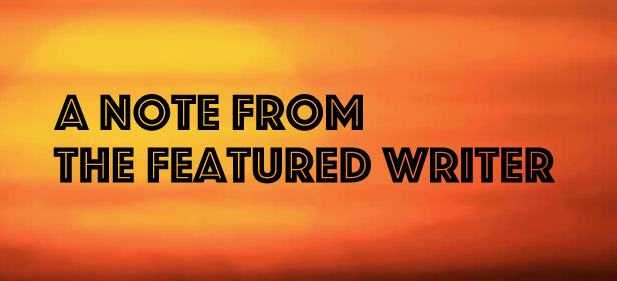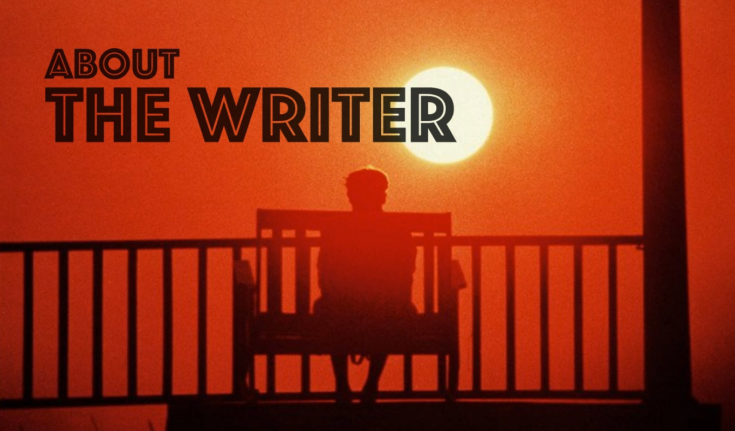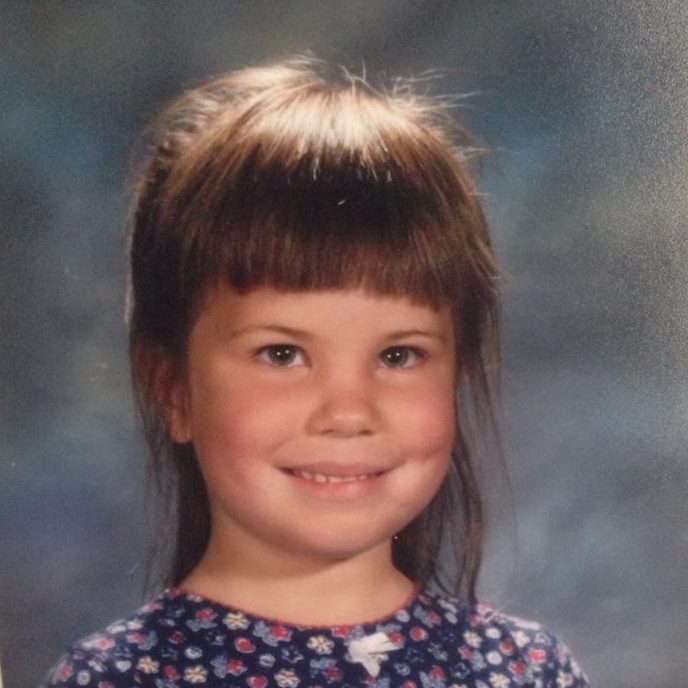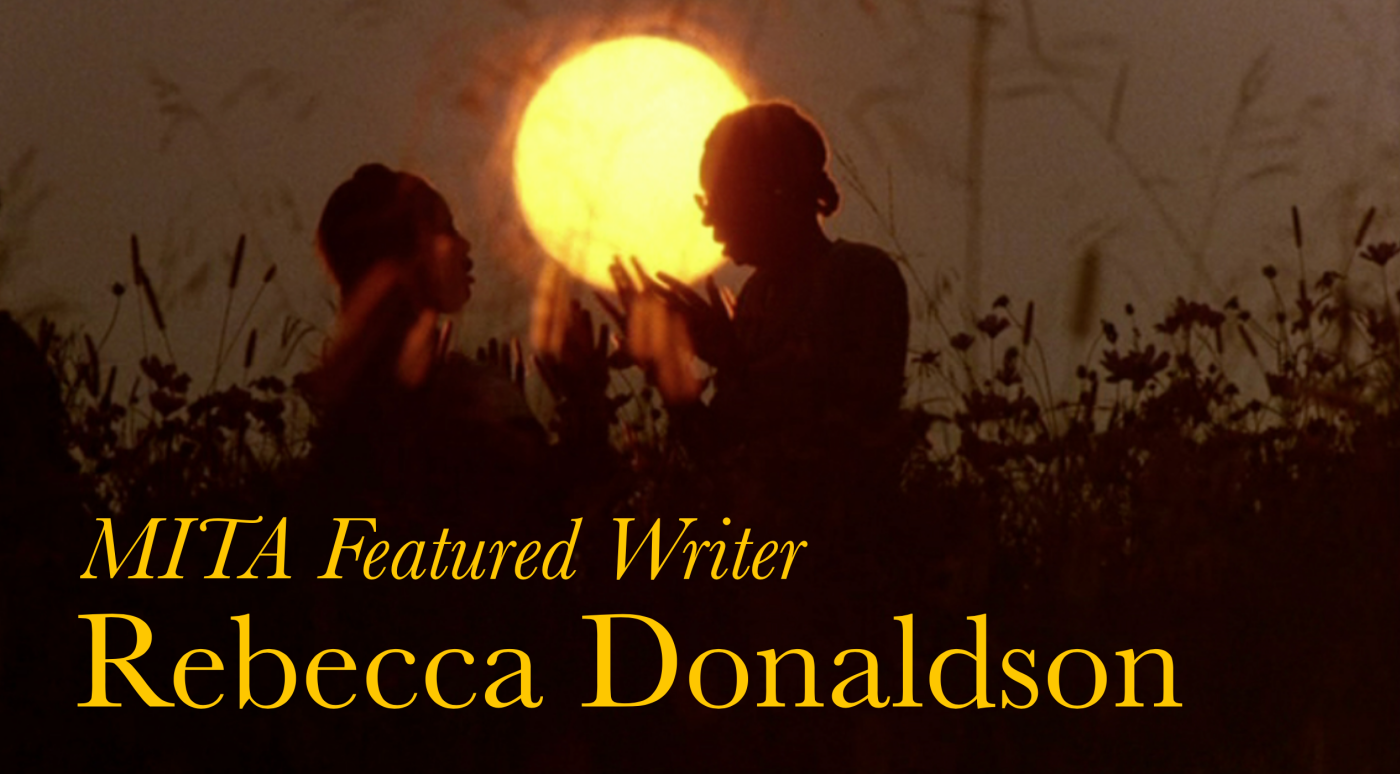Dear Little Girl, I’ve Got You: A Letter to my Inner Child
I look at a picture of you and smile at your botched bangs. Whoever cut your hair must have had their eyes closed. The left side is definitely shorter than the right. You’re cute though. Adorable. Your green eyes look just like mine, and I can see we both like flowers. You look a little sad. I wonder why. There’s a hollowness to your eyes. Either you haven’t learned to smile for the camera yet, or you’re trying not to cry. I can’t tell.
I wonder what you’re thinking. What did you have for breakfast today? How was school? What letter did you practice tracing? I bet you’re going to be a writer one day. I know you will be.
I know you have a bigger smile than this. I wish the world could see it. Do you want me to read you a book? I think you’ll love Giraffes Can’t Dance. My kids at work love it, and I think you will too. Come sit over here next to me. I’ll make you some hot cocoa and get you a blanket. You’re going to love this story.
Oh sweetie, why are you crying? Come here. I’ve got you. I’m right here. I’m not going anywhere.
Do you want me to hold you? You’re shaking your head no. It’s okay. I’ll just sit here next to you then. Let’s read this book.
The pictures are beautiful, aren’t they?
You like the colors?
Do you like giraffes?
Do you know what that word says?
You’re right. It says, “the.”
You’re going to be reading books in no time.
There’s your smile.
Aw, it’s beautiful.
You want a hug now?
Okay, any time you wish.
I’m glad you enjoyed the story.
What would you like to do tomorrow? Make pancakes? You got it. Of course, we can wear aprons. I’ll tell you what—afterwards, we will take a trip to the zoo and get ice cream.
What’s your favorite flavor? Bubble gum? Me too!
I love you too. I’m always here.
One day it won’t be like this.
One day you’re going to show the world this smile of yours, and it’s going to smile right back at you.
One day you will see the beauty beyond these walls.
For now, put your hand here on your heart and know you are not alone.
I am here, and I am not going anywhere.
The Meatball
My new therapist calls this “BPD” label I was once given a barnacle. I call it a blood-sucking meatball with large fangs. Both descriptions are fitting. My therapist has suggested that I try and leave the barnacle outside on a leash with my old psychologist so I can have a break from it, and she can take the thing for a walk by herself. I laugh at the thought of this, imagining the ugly meatball with large fangs on a bright blue dog leash, yanking my former psychologist up and down the streets of Los Angeles. I wish I could get this meatball off of me for good, but it was thrown at me hard to see if it would stick. And it did stick, not because it’s true, but because it was delivered with such vengeance for feeling suicidal. I tell nobody now when I feel sad. I think it is better that nobody knows so my personality can be left alone. I think about what my life would be like today if the meatball were never thrown at me. I’ve swallowed the sucker, and it’s lodged itself somewhere between my esophagus and the place I store my sense of self. I wish I could say I’m feeling better, but I can’t. Sometimes the meatball is all I see, and no matter how hard someone tries to tell me it isn’t true and that I’m Rebecca and not a meatball, I can’t help but feel this thing with fangs eating at my flesh and soul.
An Empathetic Dentist Makes All the Difference
“When was the last time you were seen? asks the dentist sitting on a chair next to me as he looks at my X-rays behind my head and I massage my throbbing face. It’s the 1,000-dollar question that moves me from a state of fear to full-on tears.
“15 years ago,” I whisper, sobbing and regressing to a voice of a small child. Being in a quaint, upper middle-class town, I wait for him to turn up his nose at me in disgust and exclaim, “What?!” but he doesn’t. He just keeps nodding. He just keeps looking at me with care. He just keeps showing concern.
“My parents stop taking me to the dentist when I was about 15,” I say, sobbing.
The dentist continues looking at me without gasping or expressing that I am gross. Instead, he passes me a tissue, pats me on the shoulder and says, “I’m going to take good care of you.” “Let’s get you some water, and we will make that tooth feel better and work on some of these other ones.”
I choke back tears in response to his warmth. He then flips open my chart and says, “A speech therapist, huh? Please fix my accent. I’m from Brazil.”
My eyes light up in excitement at hearing this, and I begin to converse in Portuguese with sing-song intonation, telling him all about the time I once lived in Rio de Janeiro.
“You speak fluent Portuguese? No way?! How cool of a client are you!” he exclaims, beaming. “I have the perfect thing to cheer you right up. Lean back,” he instructs.
I do as I am told and rest my head on the headrest. The Brazilian dentist then leaned in and whispers, “This is my favorite,” before slipping headphones over my ears and swaying as if he is dancing along. As he numbs my face and begins drilling, I hear and see nothing but warm Brazilian green eyes telling me that I am safe and the sounds of samba music.
For an hour, I don’t think about my tooth.
For an hour, I don’t think about childhood.
I just think about how alive I feel when I hear Brazilian Portuguese and the sound of samba music. I just think about how beautifully warm Brazilians are and what a gift it was to have lived in their country.
When the dentist is done, he shows me my tooth, saying it is beautiful now and that he would be ready to take good care of me again next week with a new artist to listen to as he works on my other teeth.
“Muito obrigada/thank you, very much,” I say, gratefully.
“Estou aqui, sempre, Rebecca/I’m always here, Rebecca,” he says. “I’m not going anywhere.”
A Love Poem for the Girls Branded with “Borderline”
I want to write a love poem for the girls who have been branded with “Borderline.”
I want to write a love poem for the girls who don’t feel loved.
I want to write a love poem for the girls who hurt so much that they call hospitals their home.
I want to write a love poem for the girls who are told they are “manipulative.”
I want to write a love poem for the girls who learned to spell “worthless” before their first name.
I want to write a love poem for the girls with “Borderline” who were never hugged.
I want to write a love poem for the girls who are unable to scrub this 10-letter word from their forehead no matter which scrub brush they use.
I want to write a love poem for the girls who are terminated for telling their therapist they love them.
I want to write a love poem for the girls who wear their hearts on both their sleeves.
I want to write a love poem for the girls who think there is something wrong with them for loving this hard.
I want to write a poem, but what I want even more is to say that you don’t have to wear this label.
It is not an identity.
It is not who you are.
I want to write a love poem for the girls who, when they look in the bathroom mirror, only see a diagnostic code.
I want to write a love poem for these girls because just maybe, instead of branding them with this label, what they need is someone to love them.
Maybe I’m not a therapist.
Maybe I’m just a poet.
Maybe this is true.
I may not have the DSM memorized, but I have saved words on a two-sided cassette.
I play side one for painful comments from therapists and side two for ones from my past.
Maybe I’m not a therapist.
Maybe this is true.
I am a poet, though, and if nobody else is
willing to, I will write the girls with “Borderline” a love poem.
I love you all.
May one day the world recognizes this diagnosis for it truly is— developmental trauma.
Courage
Hi.
Courage.
My name’s Rebecca.
Courage.
I am a woman and proud to be so.
Courage.
I will go to school.
Courage.
I will speak.
Courage.
I’ll find my own way.
Courage.
I’ll make my own money.
Courage.
I’ll keep dreaming.
Courage.
I will stand here proudly.
Courage.
Soy Rebecca. Hablo español.
Courage.
I’m speaking.
Courage.
Eu sou Rebeca. Tudo bem?
Courage.
I said no.
Courage.
I said NO.
Courage.
I stand.
Courage.
I am saying enough.
Courage.
I will live.
Courage.
That little girl is mine now.
Courage.
We will dance.
Courage.
We will sing.
Courage.
She will be cherished for the rest of her life.
Courage.
She is free now, and so I am.

I have come to believe that what adults living with complex trauma truly need is a place where they can be as they are, free of epistemic injustice, diagnostic labels, and judgement. I do not wish to be a part of our current mental health system that frequently pathologizes survivors and scorns them. Instead, I aspire to opt out and create something different in solidarity with other survivors. I aspire to be in a community where we work to write memoirs that are powerful enough to change hearts, minds, and policy. All I ask is that we drop the disorder and the behaviorism. We are all uniquely human. Love one another. Share. Listen. Make art. Play.


Rebecca Donaldson is a PhD student in Positive Developmental Psychology at Claremont Graduate University, a Mad activist, and a writer. She is an active member of ADisorder4Everyone, a community challenging the culture of psychiatric diagnosis. Her work has been published in The Psychologist, Mad in America, and Young Invincibles. She is currently a 2022-23 Herstory Fellow, where she runs the Freedom to Be memoir writing group, a space for survivors of childhood trauma to write their life stories, free of diagnostic labels and epistemic injustice.

Leave a comment